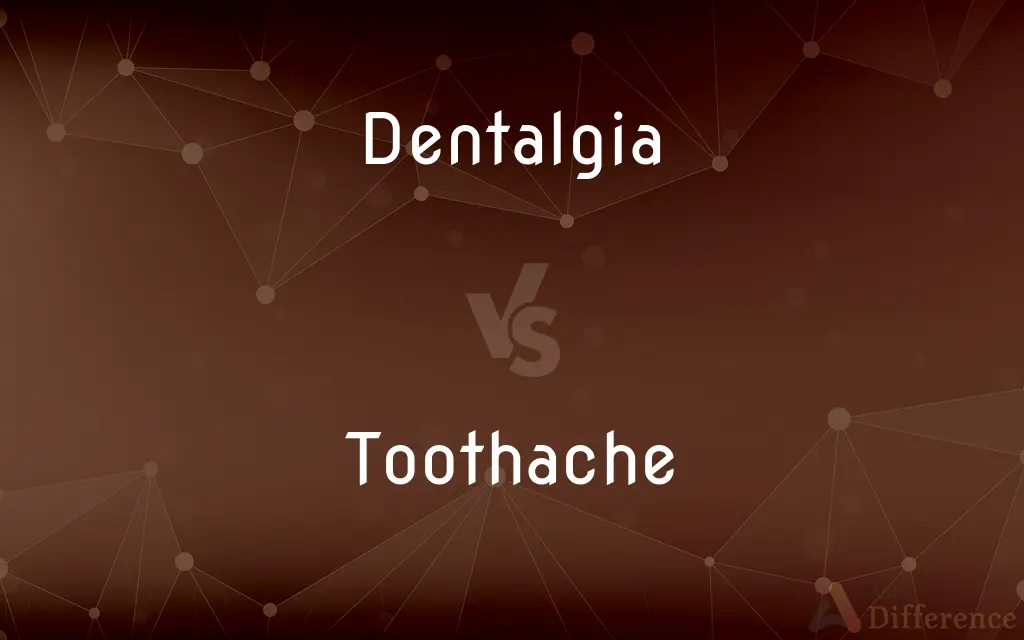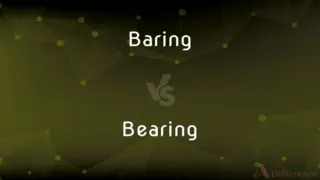Dentalgia vs. Toothache — What's the Difference?
By Tayyaba Rehman & Fiza Rafique — Updated on April 23, 2024
Dentalgia and toothache both refer to pain in the teeth, but "dentalgia" is a more clinical term, whereas "toothache" is commonly used in everyday language.

Difference Between Dentalgia and Toothache
Table of Contents
ADVERTISEMENT
Key Differences
Dentalgia is the medical term used to describe tooth pain, emphasizing a formal and clinical context. It is often used in professional dental and medical communications. On the other hand, toothache is the layman's term for the same condition, familiar and widely used in everyday conversation. This difference in usage affects how patients and healthcare providers communicate symptoms and diagnoses.
Dentalgia can be associated with a variety of dental conditions, ranging from cavities and gum disease to more severe dental abscesses. Whereas toothache is often perceived as a symptom that may not necessarily indicate a severe condition, and is sometimes treated at home without professional consultation, until the pain persists or worsens.
In medical documentation and literature, "dentalgia" is likely to be specified with additional medical terminology to describe the cause and nature of the pain. On the other hand, "toothache" is typically described in more general terms, and non-medical remedies and experiences are commonly discussed alongside it.
Dental professionals might use the term dentalgia to denote pain that is less straightforward, potentially involving nerve pain or referred pain from other areas of the face or jaw. In contrast, toothache is usually understood to be directly related to the teeth and immediately surrounding tissues.
When advising patients, healthcare providers might use the term dentalgia to stress the need for a professional evaluation. Conversely, the term toothache might be used to suggest more common and less severe causes that are relatable and easily understood by the general public.
ADVERTISEMENT
Comparison Chart
Terminology Usage
Clinical, professional contexts
Common, everyday language
Perception
Often implies a need for professional assessment
May be considered less severe initially
Associated Conditions
Can imply complex dental issues
Often associated with common dental issues
Recommended Response
Professional medical advice often suggested
Home remedies and OTC pain relievers common
Communication in Healthcare
Used in detailed medical descriptions
Used in general discussions and advice
Compare with Definitions
Dentalgia
Dental pain requiring professional evaluation.
Dentalgia in her lower jaw turned out to be from an underlying nerve condition.
Toothache
Dental pain that is typically discussed in non-clinical settings.
Everyone at the dinner table offered home remedies for his toothache.
Dentalgia
A clinical term for tooth pain, often used in medical contexts.
The patient's chart indicated dentalgia linked to an impacted molar.
Toothache
A symptom often treated with over-the-counter medications.
She took ibuprofen to alleviate her toothache.
Dentalgia
Tooth pain that may have non-dental origins.
His dentalgia was actually referred pain from sinusitis.
Toothache
Pain felt in or around a tooth or teeth.
He had a toothache that got worse when he drank something cold.
Dentalgia
Pain in a tooth or teeth.
She visited the dentist to seek relief from persistent dentalgia.
Toothache
Common term for any discomfort or pain in the teeth.
A severe toothache kept her awake all night.
Dentalgia
Specific type of tooth pain detailed in medical records.
The diagnosis was dentalgia caused by periodontal disease.
Toothache
Pain in the teeth that may indicate cavities or other issues.
Her toothache was due to a cavity that needed filling.
Dentalgia
Toothache
Toothache
Toothache, also known as dental pain, is pain in the teeth or their supporting structures, caused by dental diseases or pain referred to the teeth by non-dental diseases. When severe it may impact sleep, eating, and other daily activities.
Toothache
An aching pain in or near a tooth.
Toothache
(medicine) A pain or ache in a tooth.
Toothache
Pain in a tooth or in the teeth; odontalgia.
Toothache
An ache localized in or around a tooth
Common Curiosities
What are common causes of a toothache?
Common causes include cavities, gum disease, and tooth decay.
Can dentalgia indicate serious dental issues?
Yes, dentalgia can be associated with serious conditions, requiring professional evaluation.
What is dentalgia?
Dentalgia is a medical term for tooth pain, typically used in clinical contexts.
Is it necessary to see a dentist for every toothache?
While not every toothache requires immediate dental care, persistent or severe pain should be evaluated by a dentist.
How does toothache differ from dentalgia?
Toothache is a common term used in everyday language, while dentalgia is more clinical.
Are there any preventive measures for dentalgia?
Regular dental check-ups, good oral hygiene, and avoiding excessive sugary foods can prevent many causes of dentalgia.
Can toothache be a symptom of other health issues?
Yes, sometimes toothache can be a symptom of sinus infections or heart disease.
How can one manage pain from dentalgia at home?
Over-the-counter pain relievers and cold compresses can help, but professional advice is recommended.
How do healthcare providers diagnose dentalgia?
Diagnosis may involve dental X-rays, physical examinations, and reviewing the patient's medical history.
What symptoms accompany toothache?
Symptoms can include sharp, throbbing, or persistent pain, sensitivity to hot and cold, and swelling.
Can children experience dentalgia?
Yes, children can experience dentalgia, often related to emerging teeth or cavities.
Does toothache always mean there is a cavity?
Not always; toothache can also be caused by gum disease, impacted teeth, or infections.
Are dentalgia and toothache treated differently?
Treatment may vary based on the underlying cause but generally involves addressing the direct source of pain and associated factors.
What is the immediate treatment for severe toothache?
Immediate treatments include pain relievers, ice packs, and seeking dental care as soon as possible.
What should one avoid if suffering from toothache?
Avoid very hot or cold foods and beverages, and excessive chewing on the affected side.
Share Your Discovery

Previous Comparison
Baring vs. Bearing
Next Comparison
Pushpin vs. ThumbtackAuthor Spotlight
Written by
Tayyaba RehmanTayyaba Rehman is a distinguished writer, currently serving as a primary contributor to askdifference.com. As a researcher in semantics and etymology, Tayyaba's passion for the complexity of languages and their distinctions has found a perfect home on the platform. Tayyaba delves into the intricacies of language, distinguishing between commonly confused words and phrases, thereby providing clarity for readers worldwide.
Co-written by
Fiza RafiqueFiza Rafique is a skilled content writer at AskDifference.com, where she meticulously refines and enhances written pieces. Drawing from her vast editorial expertise, Fiza ensures clarity, accuracy, and precision in every article. Passionate about language, she continually seeks to elevate the quality of content for readers worldwide.















































